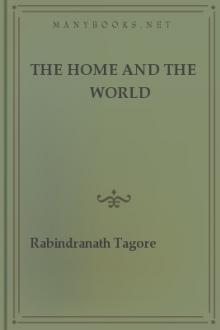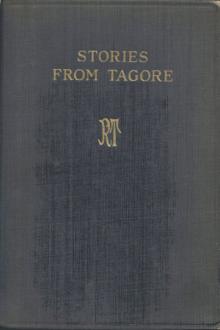The Home and the World - Rabindranath Tagore (books to read in your 30s .txt) 📗

- Author: Rabindranath Tagore
- Performer: -
Book online «The Home and the World - Rabindranath Tagore (books to read in your 30s .txt) 📗». Author Rabindranath Tagore
was Ito go on living all by myself?
I had no memento of Amulya save that pistol--his reverence-
offering. It seemed to me that this was a sign given by
Providence. This guilt which had contaminated my life at its
very root--my God in the form of a child had left with me the
means of wiping it away, and then vanished. Oh the loving gift--
the saving grave that lay hidden within it!
I opened my box and took out the pistol, lifting it reverently to
my forehead. At that moment the gongs clanged out from the
temple attached to our house. I prostrated myself in salutation.
In the evening I feasted the whole household with my cakes. "You
have managed a wonderful birthday feast--and all by yourself
too!" exclaimed my sister-in-law. "But you must leave something
for us to do." With this she turned on her gramophone and let
loose the shrill treble of the Calcutta actresses all over the
place. It seemed like a stable full of neighing fillies.
It got quite late before the feasting was over. I had a sudden
longing to end my birthday celebration by taking the dust of my
husband's feet. I went up to the bedroom and found him fast
asleep. He had had such a worrying, trying day. I raised the
edge of the mosquito curtain very very gently, and laid my head
near his feet. My hair must have touched him, for he moved his
legs in his sleep and pushed my head away.
I then went out and sat in the west verandah. A silk-cotton
tree, which had shed all its leaves, stood there in the distance,
like a skeleton. Behind it the crescent moon was setting. All
of a sudden I had the feeling that the very stars in the sky were
afraid of me--that the whole of the night world was looking
askance at me. Why? Because I was alone.
There is nothing so strange in creation as the man who is alone.
Even he whose near ones have all died, one by one, is not alone--
companionship comes for him from behind the screen of death. But
he, whose kin are there, yet no longer near, who has dropped out
of all the varied companionship of a full home--the starry
universe itself seems to bristle to look on him in his darkness.
Where I am, I am not. I am far away from those who are around
me. I live and move upon a world-wide chasm of separation,
unstable as the dew-drop upon the lotus leaf.
Why do not men change wholly when they change? When I look into
my heart, I find everything that was there, still there--only
they are topsy-turvy. Things that were well-ordered have become
jumbled up. The gems that were strung into a necklace are now
rolling in the dust. And so my heart is breaking.
I feel I want to die. Yet in my heart everything still lives--
nor even in death can I see the end of it all: rather, in death
there seems to be ever so much more of repining. What is to be
ended must be ended in this life--there is no other way out.
Oh forgive me just once, only this time, Lord! All that you gave
into my hands as the wealth of my life, I have made into my
burden. I can neither bear it longer, nor give it up. O Lord,
sound once again those flute strains which you played for me,
long ago, standing at the rosy edge of my morning sky--and let
all my complexities become simple and easy. Nothing save the
music of your flute can make whole that which has been broken,
and pure that which has been sullied. Create my home anew with
your music. No other way can I see.
I threw myself prone on the ground and sobbed aloud. It was for
mercy that I prayed--some little mercy from somewhere, some
shelter, some sign of forgiveness, some hope that might bring
about the end. "Lord," I vowed to myself, "I will lie here,
waiting and waiting, touching neither food nor drink, so long as
your blessing does not reach me."
I heard the sound of footsteps. Who says that the gods do not
show themselves to mortal men? I did not raise my face to look
up, lest the sight of it should break the spell. Come, oh come,
come and let your feet touch my head. Come, Lord, and set your
foot upon my throbbing heart, and at that moment let me die.
He came and sat near my head. Who? My husband! At the first
touch of his presence I felt that I should swoon. And then the
pain at my heart burst its way out in an overwhelming flood of
tears, tearing through all my obstructing veins and nerves. I
strained his feet to my bosom--oh, why could not their impress
remain there for ever?
He tenderly stroked my head. I received his blessing. Now I
shall be able to take up the penalty of public humiliation which
will be mine tomorrow, and offer it, in all sincerity, at the
feet of my God.
But what keeps crushing my heart is the thought that the festive
flutes which were played at my wedding, nine years ago, welcoming
me to this house, will never sound for me again in this life.
What rigour of penance is there which can serve to bring me once
more, as a bride adorned for her husband, to my place upon that
same bridal seat? How many years, how many ages, aeons, must
pass before I can find my way back to that day of nine years ago?
God can create new things, but has even He the power to create
afresh that which has been destroyed?
Chapter Twelve
Nikhil's Story
XV
TODAY we are going to Calcutta. Our joys and sorrows lie heavy
on us if we merely go on accumulating them. Keeping them and
accumulating them alike are false. As master of the house I am
in an artificial position--in reality I am a wayfarer on the path
of life. That is why the true Master of the House gets hurt at
every step and at last there comes the supreme hurt of death.
My union with you, my love, was only of the wayside; it was well
enough so long as we followed the same road; it will only hamper
us if we try to preserve it further. We are now leaving its
bonds behind. We are started on our journey beyond, and it will
be enough if we can throw each other a glance, or feel the touch
of each other's hands in passing. After that? After that there
is the larger world-path, the endless current of universal life.
How little can you deprive me of, my love, after all? Whenever I
set my ear to it, I can hear the flute which is playing, its
fountain of melody gushing forth from the flute-stops of
separation. The immortal draught of the goddess is never
exhausted. She sometimes breaks the bowl from which we drink it,
only to smile at seeing us so disconsolate over the trifling
loss. I will not stop to pick up my broken bowl. I will march
forward, albeit with unsatisfied heart.
The Bara Rani came and asked me: "What is the meaning, brother,
of all these books being packed up and sent off in box-loads?"
"It only means," I replied, "that I have not yet been able to get
over my fondness for them."
"I only wish you would keep your fondness for some other things
as well! Do you mean you are never coming back home?"
"I shall be coming and going, but shall not immure myself here
any more."
"Oh indeed! Then just come along to my room and see how many
things I have been unable to shake off my fondness
for." With this she took me by the hand and marched me off.
In my sister-in-law's rooms I found numberless boxes and bundles
ready packed. She opened one of the boxes and said: "See,
brother, look at all my pan-making things. In this bottle
I have catechu powder scented with the pollen of screw-pine
blossoms. These little tin boxes are all for different kinds of
spices. I have not forgotten my playing cards and draught-board
either. If you two are over-busy, I shall manage to make other
friends there, who will give me a game. Do you remember this
comb? It was one of the Swadeshi combs you brought for
me..."
"But what is all this for, Sister Rani? Why have you been
packing up all these things?"
"Do you think I am not going with you?"
"What an extraordinary idea!"
"Don't you be afraid! I am not going there to flirt with you,
nor to quarrel with the Chota Rani! One must die sooner or
later, and it is just as well to be on the bank of the holy
Ganges before it is too late. It is too horrible to think of
being cremated in your wretched burning-ground here, under that
stumpy banian tree--that is why I have been refusing to die, and
have plagued you all this time."
At last I could hear the true voice of home. The Bara Rani came
into our house as its bride, when I was only six years old. We
have played together, through the drowsy afternoons, in a corner
of the roof-terrace. I have thrown down to her green amras from
the tree-top, to be made into deliciously indigestible chutnies
by slicing them up with mustard, salt and fragrant herbs. It was
my part to gather for her all the forbidden things from the
store-room to be used in the marriage celebration of her doll;
for, in the penal code of my grandmother, I alone was exempt from
punishment. And I used to be appointed her messenger to my
brother, whenever she wanted to coax something special out of
him, because he could not resist my importunity. I also remember
how, when I suffered under the rigorous r�gime of the doctors of
those days--who would not allow anything except warm water and
sugared cardamom seeds during feverish attacks--my sister-in-law
could not bear my privation and used to bring me delicacies on
the sly. What a scolding she got one day when she was caught!
And then, as we grew up, our mutual joys and sorrows took on
deeper tones of intimacy. How we quarrelled! Sometimes
conflicts of worldly interests roused suspicions and jealousies,
making breaches in our love; and when the Chota Rani came in
between us, these breaches seemed as if they would never be
mended, but it always turned out that the healing forces at
bottom proved more powerful than the wounds on the surface.
So has a true relationship grown up between us, from our
childhood up till now, and its branching foliage has spread and
broadened over every room and verandah and terrace of this great
house. When I saw the Bara Rani make ready, with all her
belongings, to depart from this house of ours, all the ties that
bound us, to their wide-spreading ends, felt the shock.
The reason was clear to me, why she had made up her mind to drift
away





Comments (0)